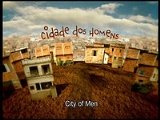
City of Men
Encyclopedia
City of Men is a Brazil
ian television programme created by Kátia Lund
and Fernando Meirelles
, the directors
of the film
City of God.
The mini-series
was watched by 35 million viewers in Brazil and was released internationally on DVD
shortly after the film. In 2007, a feature length film based on the series (produced by Fox and TV Globo) was released.
It is often cited as a 'spin-off
' of the film; City of Men is a less violent and more light-hearted affair with dramedy elements (the film adaptation is darker, sharing its roots of City of God). However, the two do share some common aspects: the directors, some of the actor
s, and the setting of the Brazilian favela
with its background of gangster
s and poverty
.
The programme tells the stories of Luis Claudío and Uolace, better known by their nicknames Acerola (Douglas Silva
) and Laranjinha (Darlan Cunha
), respectively, who are two best friends who live in a notorious Rio
slum, in a community of drug-dealers
, hustlers, and teenagers struggling to fulfill their dreams.
, the largest TV channel in Brazil, the show aired Fridays, at 11 O'clock pm
(local Brazilian time: -3 UTC
) for four seasons.
Each season of the program aired roughly one year after the previous one, and the characters, as it happens with the actors who portray them, are shown to age from one season to the next. As a result, the stories of each season reflect the struggles of poor kids from Rio de Janeiro in the appropriate age group: in Season 1, the characters are about 13 years old, that is, barely out of childhood and into adolescence; in Season 4 (the final season), they are 17, on the verge of adulthood, and their dilemmas vary accordingly. A movie with Laranjinha and Acerola turning 18 has now been released in Brazil and in the United States.
Silva and Cunha starred in the 2000 short film Palace II, directed by Meirelles, a dry run for the film City of God. In the short, Silva played Larinjinha and Cunha played Acerola.
and original DVD releases in Brazil (except for the international DVD release).
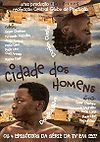
in 2002 (aired between October 4 and October 18), released on DVD
on February 12, 2003
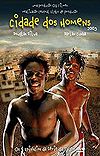

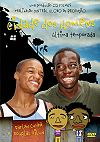
N Finale special: animated episode extrapolating on the main characters' future.
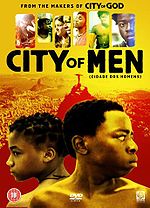
Entire Series - US DVD
Brazil
Brazil , officially the Federative Republic of Brazil , is the largest country in South America. It is the world's fifth largest country, both by geographical area and by population with over 192 million people...
ian television programme created by Kátia Lund
Kátia Lund
Kátia Lund is an American-Brazilian film director and screenwriter. Her most notable work was as co-director of the film City of God....
and Fernando Meirelles
Fernando Meirelles
Fernando Ferreira Meirelles is a Brazilian film director, producer and screenwriter.He was nominated for an Academy Award for Best Director in 2004 for his work in the Brazilian film City of God, released in 2002 in Brazil and in 2003 in the U.S. by Miramax Films...
, the directors
Film director
A film director is a person who directs the actors and film crew in filmmaking. They control a film's artistic and dramatic nathan roach, while guiding the technical crew and actors.-Responsibilities:...
of the film
Film
A film, also called a movie or motion picture, is a series of still or moving images. It is produced by recording photographic images with cameras, or by creating images using animation techniques or visual effects...
City of God.
The mini-series
Miniseries
A miniseries , in a serial storytelling medium, is a television show production which tells a story in a limited number of episodes. The exact number is open to interpretation; however, they are usually limited to fewer than a whole season. The term "miniseries" is generally a North American term...
was watched by 35 million viewers in Brazil and was released internationally on DVD
DVD
A DVD is an optical disc storage media format, invented and developed by Philips, Sony, Toshiba, and Panasonic in 1995. DVDs offer higher storage capacity than Compact Discs while having the same dimensions....
shortly after the film. In 2007, a feature length film based on the series (produced by Fox and TV Globo) was released.
It is often cited as a 'spin-off
Spin-off (media)
In media, a spin-off is a radio program, television program, video game, or any narrative work, derived from one or more already existing works, that focuses, in particular, in more detail on one aspect of that original work...
' of the film; City of Men is a less violent and more light-hearted affair with dramedy elements (the film adaptation is darker, sharing its roots of City of God). However, the two do share some common aspects: the directors, some of the actor
Actor
An actor is a person who acts in a dramatic production and who works in film, television, theatre, or radio in that capacity...
s, and the setting of the Brazilian favela
Favela
A favela is the generally used term for a shanty town in Brazil. In the late 18th century, the first settlements were called bairros africanos . This was the place where former slaves with no land ownership and no options for work lived. Over the years, many freed black slaves moved in...
with its background of gangster
Gangster
A gangster is a criminal who is a member of a gang. Some gangs are considered to be part of organized crime. Gangsters are also called mobsters, a term derived from mob and the suffix -ster....
s and poverty
Poverty
Poverty is the lack of a certain amount of material possessions or money. Absolute poverty or destitution is inability to afford basic human needs, which commonly includes clean and fresh water, nutrition, health care, education, clothing and shelter. About 1.7 billion people are estimated to live...
.
The programme tells the stories of Luis Claudío and Uolace, better known by their nicknames Acerola (Douglas Silva
Douglas Silva
Douglas Silva is a Brazilian Emmy-nominated actor whose most famous role is that of Dadinho in the 2002 Brazilian film, City of God. He also played Acerola in the spin-off series City of Men and the 2007 film based on it....
) and Laranjinha (Darlan Cunha
Darlan Cunha
Darlan Cunha is a Brazilian actor. Better known as Laranjinha from his breakthrough role in Cidade dos Homens and from his part in the film Cidade de Deus...
), respectively, who are two best friends who live in a notorious Rio
Rio de Janeiro
Rio de Janeiro , commonly referred to simply as Rio, is the capital city of the State of Rio de Janeiro, the second largest city of Brazil, and the third largest metropolitan area and agglomeration in South America, boasting approximately 6.3 million people within the city proper, making it the 6th...
slum, in a community of drug-dealers
Illegal drug trade
The illegal drug trade is a global black market, dedicated to cultivation, manufacture, distribution and sale of those substances which are subject to drug prohibition laws. Most jurisdictions prohibit trade, except under license, of many types of drugs by drug prohibition laws.A UN report said the...
, hustlers, and teenagers struggling to fulfill their dreams.
Production
A co-production of Meirelles' (through his studio, O2 Filmes) and Globo TVRede Globo
Rede Globo , or simply Globo, is a Brazilian television network, launched by media mogul Roberto Marinho on April 26, 1965. It is owned by media conglomerate Organizações Globo, being by far the largest of its holdings...
, the largest TV channel in Brazil, the show aired Fridays, at 11 O'clock pm
12-hour clock
The 12-hour clock is a time conversion convention in which the 24 hours of the day are divided into two periods called ante meridiem and post meridiem...
(local Brazilian time: -3 UTC
Coordinated Universal Time
Coordinated Universal Time is the primary time standard by which the world regulates clocks and time. It is one of several closely related successors to Greenwich Mean Time. Computer servers, online services and other entities that rely on having a universally accepted time use UTC for that purpose...
) for four seasons.
Each season of the program aired roughly one year after the previous one, and the characters, as it happens with the actors who portray them, are shown to age from one season to the next. As a result, the stories of each season reflect the struggles of poor kids from Rio de Janeiro in the appropriate age group: in Season 1, the characters are about 13 years old, that is, barely out of childhood and into adolescence; in Season 4 (the final season), they are 17, on the verge of adulthood, and their dilemmas vary accordingly. A movie with Laranjinha and Acerola turning 18 has now been released in Brazil and in the United States.
Silva and Cunha starred in the 2000 short film Palace II, directed by Meirelles, a dry run for the film City of God. In the short, Silva played Larinjinha and Cunha played Acerola.
Episodes
The dates listed below are the original air dates on Globo TVRede Globo
Rede Globo , or simply Globo, is a Brazilian television network, launched by media mogul Roberto Marinho on April 26, 1965. It is owned by media conglomerate Organizações Globo, being by far the largest of its holdings...
and original DVD releases in Brazil (except for the international DVD release).

Season 1
ProducedTelevision producer
The primary role of a television Producer is to allow all aspects of video production, ranging from show idea development and cast hiring to shoot supervision and fact-checking...
in 2002 (aired between October 4 and October 18), released on DVD
DVD
A DVD is an optical disc storage media format, invented and developed by Philips, Sony, Toshiba, and Panasonic in 1995. DVDs offer higher storage capacity than Compact Discs while having the same dimensions....
on February 12, 2003
- A Coroa do Imperador (The Emperor's Crown)
- When their history teacher announces a surprise plan to take the class on an educational field trip to see The Emperor's Crown and learn more about the Napoleonic Wars, Laranjinha and Acerola greet the news with ambivalence. After all, how are they supposed to come up with the
 6.50 it will cost each of them to go? Acerola and Laranjinha try to scrape together the money to go on the field-trip. A war breaks out in the favela and Acerola comes to realize its similarity to the Napoleonic warsNapoleonic WarsThe Napoleonic Wars were a series of wars declared against Napoleon's French Empire by opposing coalitions that ran from 1803 to 1815. As a continuation of the wars sparked by the French Revolution of 1789, they revolutionised European armies and played out on an unprecedented scale, mainly due to...
6.50 it will cost each of them to go? Acerola and Laranjinha try to scrape together the money to go on the field-trip. A war breaks out in the favela and Acerola comes to realize its similarity to the Napoleonic warsNapoleonic WarsThe Napoleonic Wars were a series of wars declared against Napoleon's French Empire by opposing coalitions that ran from 1803 to 1815. As a continuation of the wars sparked by the French Revolution of 1789, they revolutionised European armies and played out on an unprecedented scale, mainly due to...
.
- When their history teacher announces a surprise plan to take the class on an educational field trip to see The Emperor's Crown and learn more about the Napoleonic Wars, Laranjinha and Acerola greet the news with ambivalence. After all, how are they supposed to come up with the
- O Cunhado do Cara (The Man's Brother-in-Law)
- When Acerola's sister starts dating the "Favela boss" (the drug dealer) everybody suddenly starts to respect him. He's never had this much status in the neighborhood before—and he's never had this much temptation to abuse it. Acerola goes too far with his new found powers and strains his friendship with Laranjinha.
- Correio (The Post)
- Laranjinha and Acerola become the favela's postmen. Acerola's favela is so dangerous that even the government won't deliver mail there, a serious problem that irks the residents and prompts a local drug lord to make Acerola the ad hoc postmaster. It's a good plan … that is, until Acerola and Laranjinha try to make some improvements to the system and initiate a scheme to name the streets of the favela.
- Uólace e João Vitor (Uólace and João Vitor)
- A day in the life of Uólace (Laranjinha) and João Victor. On any given day, 13-year-old Laranjinha is struggling to survive in his dangerous favela, where violence runs rampant and hunger is a way of life. Meanwhile, in a well-appointed apartment overlooking Laranjinha's neighborhood, 13-year-old João Vitor (Thiago Martins) has a radically different perspective. João Vitor is a middle-class boy raised by his single mother. The apparent differences between the two lives are subsumed by their similarities.

Season 2
Produced in 2003 (aired between October 14 and November 11), released on DVD on February 27, 2004- Sábado (Saturday)
- Like most teenagers living in favelas, Larajinha and Acerola can't wait for the funk cariocaFunk cariocaFunk carioca , favela funk and, elsewhere in the world, baile funk, is a type of dance music from Rio de Janeiro, derived from Miami bass....
dance. Armed with a new hairstyle, Laranjinha looks forward to an all-night dance party, where he aims to make out with at least four pretty girls. Meanwhile, Acerola hopes his performance with a funk dance group will impress a fellow classmate (Camila Monteiro).
- Like most teenagers living in favelas, Larajinha and Acerola can't wait for the funk carioca
- Dois Pra Brasília (Two Tickets to BrasíliaBrasíliaBrasília is the capital city of Brazil. The name is commonly spelled Brasilia in English. The city and its District are located in the Central-West region of the country, along a plateau known as Planalto Central. It has a population of about 2,557,000 as of the 2008 IBGE estimate, making it the...
)- Determined to help a girl he likes get her grandfather out of prison (he’s been in prison for two and half years longer than his sentence), Acerola enlists Laranjinha and a borrowed camcorder from the neighborhood to film his journey from Rio to the capital city of Brasilia, all so he can deliver a letter to President Luiz Inacio Lula da SilvaLuiz Inácio Lula da SilvaLuiz Inácio Lula da Silva , known popularly as Lula, served as the 35th President of Brazil from 2003 to 2010.A founding member of the Workers' Party , he ran for President three times unsuccessfully, first in the 1989 election. Lula achieved victory in the 2002 election, and was inaugurated as...
.
- Determined to help a girl he likes get her grandfather out of prison (he’s been in prison for two and half years longer than his sentence), Acerola enlists Laranjinha and a borrowed camcorder from the neighborhood to film his journey from Rio to the capital city of Brasilia, all so he can deliver a letter to President Luiz Inacio Lula da Silva
- Tem Que Ser Agora (It Has To Be Now)
- The beach, the great leveller of Brazilian society, where all the social classes meet. Laranjinha and Acerola are on a mission to deliver some surfboards, head to the coast and find that everyone else in Rio had the same idea. The holiday takes an unexpected turn when the boys catch wind of a rumor that, if true, could have serious implications. Laranjinha flirts with Camila and finds out she's an upper middle-class girl. Duda tries to avoid João when she finds he's from the favela. Suddenly, a group of middle-class 'playboys' starts a confrontation. In the middle of all this confusion the teenagers only think about one thing: losing their virginityVirginityVirginity refers to the state of a person who has never engaged in sexual intercourse. There are cultural and religious traditions which place special value and significance on this state, especially in the case of unmarried females, associated with notions of personal purity, honor and worth...
.
- The beach, the great leveller of Brazilian society, where all the social classes meet. Laranjinha and Acerola are on a mission to deliver some surfboards, head to the coast and find that everyone else in Rio had the same idea. The holiday takes an unexpected turn when the boys catch wind of a rumor that, if true, could have serious implications. Laranjinha flirts with Camila and finds out she's an upper middle-class girl. Duda tries to avoid João when she finds he's from the favela. Suddenly, a group of middle-class 'playboys' starts a confrontation. In the middle of all this confusion the teenagers only think about one thing: losing their virginity
- Os Ordinários (The Ordinaries)
- While surfing, Acerola saves a wealthy Japanese-Brazilian boy from drowning at the beach, his actions spark an unexpected friendship that crosses color and socioeconomic boundaries. They bond and Acerola, Laranjinha and João start hanging out with the boy and his brother, who are from São PauloSão PauloSão Paulo is the largest city in Brazil, the largest city in the southern hemisphere and South America, and the world's seventh largest city by population. The metropolis is anchor to the São Paulo metropolitan area, ranked as the second-most populous metropolitan area in the Americas and among...
. The result is a group they dub The Ordinaries.
- While surfing, Acerola saves a wealthy Japanese-Brazilian boy from drowning at the beach, his actions spark an unexpected friendship that crosses color and socioeconomic boundaries. They bond and Acerola, Laranjinha and João start hanging out with the boy and his brother, who are from São Paulo
- Buraco Quente (Hot Spot)
- Laranjinha's Cousin Espeto (Phelipe Haagensen) manages drug dealing in his area. When Espeto has a near-death experience, it prompts him to reevaluate his life, and his career as a criminal. Espeto wants out, but leaving the business can be tough, So Laranjinha and Acerola help out. Can the boys help him break out of the drug trade, or is turning over a new page destined to cost him his life?

Season 3
Produced in 2004 (aired between September 24 and October 22), released on DVD on March 30, 2005- A Estréia (Opening Night - First Time)
- When Acerola's mother goes out of town for the weekend and leaves him without a chaperone, the boys become swinging bachelors and vow to practice their romantic skills with some local girls. Will their Saturday night soiree turn out to be the love fest they envisioned?
- Foi Sem Querer (It Was an Accident)
- When Laranjinha romances a pretty girl who just so happens to have a boyfriend, he ticks off her jealous beau and has to enlist Acerola for protection. Meanwhile, the boys try their hand at a small business to raise money for the favela's community center.
- Vacilo É Um Só (Can't Screw Up Twice - Take It Like a Man)
- Learning about the breeding habits of tiny ants in school prompts Laranjinha, Acerola and their classmates to think big about their own sexuality. Meanwhile, Acerola strives to stay out of trouble by spending the day with the leader of the favela's community association.
- Hip Sampa Hop
- When Laranjinha's cousin, Espeto, announces he's taking a trip to São PauloSão PauloSão Paulo is the largest city in Brazil, the largest city in the southern hemisphere and South America, and the world's seventh largest city by population. The metropolis is anchor to the São Paulo metropolitan area, ranked as the second-most populous metropolitan area in the Americas and among...
, Laranjinha and Acerola decide to tag along. Once there, they discover the city's vibrant hip-hop scene and become immersed in the culture—and the drama that goes along with it.
- When Laranjinha's cousin, Espeto, announces he's taking a trip to São Paulo
- Pais e Filhos (Fathers and Sons - Parents and Kids)
- When Laranjinha and Acerola apply for social security at work, it prompts thoughts about their futures and jump-starts Laranjinha's quest for his own "lost" father. Will he find the paternal figure he's been looking for?

Season 4 (final season)
Produced in 2005 (aired between November 18 and December 16), released on DVD on April 25, 2006- A Fila (The Line)
- Tá Sobrando Mês (Too Many Days in a Month)
- Atração Fatal (Fatal Attraction)
- As Aparências Enganam (Appearances Can Be Deceiving)
- Em Algum Lugar do Futuro (Somewhere in the Future)N
N Finale special: animated episode extrapolating on the main characters' future.

International release
Internationally, a DVD was released including the episodes from both seasons 1 and 2. The DVD was released on 27 September 2004.- The Emperor's Crown
- The Man's Brother-in-Law
- The Post
- Uólace And João Vitor
- Saturday/Sunday
- The Two On Their Way To Brasília
- It Has To Be Now
- The Ordinaries
- Hot Spot
Entire Series - US DVD
- Actors: Leandro Firmino, Alexandre Rodrigues, Daniel Zettel, See more
- Directors: Philippe Barcinski, César CharloneCésar Charlone (cinematographer)César Charlone is an Uruguayan-born Brazilian film director, screenwriter, actor and cinematographer. He was born in Montevideo, but settled in Brazil, his current homeland. In 2003, he was nominated for the Academy Award for Best Cinematography for his work on the highly acclaimed film City of God...
- Format: Box set, Color, Full Screen, Subtitled, NTSC
- Language: Portuguese
- Region: Region 1 (U.S. and Canada only.)
- Number of discs: 3
- Rating NR
- Studio: Palm Pictures / Unvd
- DVD Release Date: September 26, 2006
- Run Time: 570 minutes
- DVD Features:
- Available Subtitles: English
- Available Audio Tracks: Portuguese (Unknown Format)
- 19 episodes on three discs
Soundtrack
- "Homem Amarelo" - O RappaO RappaO Rappa is a Brazilian reggae/rock band from Rio de Janeiro, Brazil. They combine many styles such as Rock, Reggae, Funk, Hip hop and Samba...
- "Qual é?" - Marcelo D2Marcelo D2Marcelo D2 is a Brazilian rapper.- Biography :A former vocalist of the band Planet Hemp, he started his solo career in 1998 with the album Eu Tiro É Onda. The album was recorded in his studio by David Corcos, and was mixed in New York and Los Angeles by Carlos Bass and Mário Caldato Jr...
- "A Fumaça Já Subiu pra Cuca" - Bezerra da SilvaBezerra da SilvaJosé Bezerra da Silva was a Brazilian samba musician of the partido alto style.-Biography:...
- "Morro e Asfalto" - Darlan CunhaDarlan CunhaDarlan Cunha is a Brazilian actor. Better known as Laranjinha from his breakthrough role in Cidade dos Homens and from his part in the film Cidade de Deus...
/ Thiago Martins - "Vem Cristiane" - MC Tam
- "Us Mano e As Mina" - Xis
- "Sonho Juvenil (Garoto Zona Sul)" - Jovelina Pérola Negra
- "João Teimoso" - MC Pé de Pano
- "Prioridades" - Bnegão
- "Quando Eu Contar (Iaiá)" - Zeca PagodinhoZeca PagodinhoZeca Pagodinho is a Brazilian singer/songwriter working in the genres of samba and pagode.-Biography:...
- "Dama Tereza" - Sabotage (rap artist)
- "Sou Feia Mas Tô na Moda" - Tati Quebra BarracoTati Quebra BarracoTati Quebra Barraco, , is a charismatic and rebellious Brazilian female MC, whose music consists mostly of funk/hip hop and Bilar funk genre. Tati is considered Brazil's first lady of hip hop as the first woman to break the barrier of male-only funkers...
- "Menina Crioula" - Jorge Ben JorJorge Ben JorJorge Ben Jor is a Brazilian popular musician. His characteristic style fuses samba, funk, and rock into samba-rock, with lyrics that blend humor and satire with often esoteric subject matter.-Early life and career:...
- "Lixo do Mangue" - Chico ScienceChico ScienceFrancisco de Assis França , better known as Chico Science, was a Brazilian singer and composer and one of the founders of the Mangue Beat cultural movement...
e Nação ZumbiNação ZumbiNação Zumbi is a Brazilian rock band formed by Chico Science. The musicians of the group continued as Nação Zumbi after Chico died in a car accident on February 2, 1997....

